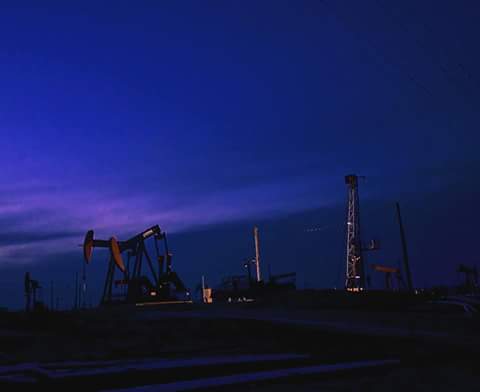Photo by Jerry D Mathes III
by Sophie Nguebana, Elisabeth Nguebana, Glenda Pavon, Alexander Geysman, Daniel Tsvetanov
Oil Companies Book Tankers to Store Oil in Amount Unseen in 4 Years
Shipping operators report that oil companies requested up to 9 million barrel storage capacities in supertankers. That hasn’t been seen in 4 and a half years. All land-based storage facilities must be close to full. This may be a sign of several things: either there is a tangible oversupply on a market, driven by increased production from Russia, Nigeria, Kazakhstan, Canada and Brazil, or this is just a contango maneuver in anticipation of price increase after OPEC Summit later this month. Time will tell.
Alex Longley. Oil Tankers Used to Store Millions of Barrels as Land Sites Fill. November 11, Bloomberg. https://www.bloomberg.com/news/articles/2016-11-11/oil–tankers–used–to–store–millions–of–barrels–as–land–sites–fill
The Future of US Pipeline Investment
The Dakota Access Pipeline is facing opposition, as did the Keystone Pipeline before it. The election of Donald Trump will reduce but not eliminate some of those concerns. The Dakota Access Pipeline (DAPL) would connect the Bakken with major markets in Illinois. The proposed path is almost 2,000km through North Dakota, South Dakota, Iowa, and Illinois. The pipeline passes through several Indian reservations and there are concerns, like the Keystone Pipeline before it, that it could impact not just sacred tribal areas but also the water supply. In September, a judge ruled that construction could continue, while around the same time the Justice Department, the Army, and the Department of State ordered that any construction on Army Corps land had to be halted. Pipeline projects like the DAPL and the Keystone are becoming increasingly difficult to complete due to strong opposition from environmental groups. These challenges will not go away under a Trump presidency. If a pipeline’s route is intended to cross a democratic state, local and state officials will be able to delay or entirely stop development. The Democratic state of Illinois, which the DAPL is intended to cross, is therefore still a concern. In the case of Bakken crude, the DAPL is very much needed for transport. Bakken crude is volatile, which has led to explosions and train derailments. Without the pipeline, the less safe transport methods of rail and truck will continue. In the end the implication is that existing pipelines will be more valuable in the future. Demand for new pipelines will increase or at a minimum be sustained, merely because of population growth. If access to new pipelines is restricted, existing pipelines themselves will become much more valuable.
Michael McDonald. Death by a thousand cuts: Can Donald Trump save US pipelines?. Oilprice.com. November 9, 2016.
http://oilprice.com/Energy/Energy-General/Death-By-A-Thousand-Cuts-Can-Trump-Save-US-Pipelines.html
Iran’s first joint venture after sanctions
On Monday, November 7, Iran signed a 4.8 billion USD deal to develop the offshore South Pars gas field. Total and CNPC are part to the deal, which appears to be the first joint venture with international partners since sanctions were lifted. The companies will establish a consortium, where Total will control 50.1 percent in the project, CNPC taking 30 percent and Iran’s Petropars the balance. Iran has the world’s biggest natural gas reserves, estimated by BP at 34 trillion cubic meters. The South Pars gas field is Iran’s section of the world’s biggest deposit, also shared with Qatar. The gas field has 14,000 billion cubic meters of gas, or 8% of the world’s known reserves. Before sanctions, Total had worked in the Iranian portion of South Pars. Since its subsidiary was hired in 1997. CNPC signed a deal to develop the South Pars in 2012, but had to pull out. This deal will inspire other companies to invest in Iran. Currently, Teheran said it needs $30 billion USD of foreign investment for its energy projects that have suffered from years of sanctions.
Golnar Motevalli, Hashem Kalantari and Javier Blas : Total, China Join Iran’s First Gas Deal Since Sanctions Eased. Bloomberg, November 9, 2016. http://www.bloomberg.com/news/articles/2016-11-08/total-china-share-iran-s-first-gas-deal-since-sanctions-eased
Tanzania, Uganda agree to speed up oil pipeline project
Uganda had discovered crude oil near its border with the Democratic Republic of Congo already a decade ago, but has not yet been able to export it. There seems to be a progress toward Ugandan oil exports, as the talks on Uganda-Tanzania pipeline have progressed. On Thursday, November 10, talks in Kampala, Uganda between Ugandan President Yoweri Museveni and his Tanzanian counterpart John Magufuli resulted in an agreement on accelerating the implementation of a 1,410km crude oil pipeline project between the two East African countries. France’s Total, London Tullow Oil, and China’s CNOOC could be involved in order to accelerate the construction and allow the project to be completed in just over a one-year period.
Tanzania, Uganda agree to speed up oil pipeline project. Reuters Africa. November 11, 2016. http://af.reuters.com/article/investingNews/idAFKBN1360KP
Egypt: The Second month without Saudi Oil
According to the Egyptian Oil Ministry, Egypt will not receive oil from the Saudi Arabian company Aramco for the second straight month. The country is stocking up again from international markets because of a disagreement on the situation in Syria where relations between Egypt and Saudi have become strained. The consequence of this quarrel is that the Saudi oil company decided to not supply Egypt any longer beginning in October of this year. This decision risks seriously affecting the Egyptian economy, and Egypt has even decided to devaluate its currency in order to try to overcome the national monetary crisis.
Jeuna Afrique: Egypt, Egypt: The Second month without Saudi Oil, Jeune Afrique November 7th, 2016. http://www.jeuneafrique.com/372101/economie/egypte-deuxieme-mois-consecutif-petrole-saoudien/
Nigeria getting its NOC on the markets, and maybe back into shape
NNPC, Nigeria’s state oil company, is undergoing plans to be overhauled and listed on a stock exchange. The purpose of this move is to modernize Nigeria’s oil company, and to start bashing its widespread corruption and mismanagement. The idea is to make NNPC autonomous from the state so that it may start operating more efficiently once faced with markets rules and private sector management. Behind both these moves there is not only a wish to improve the efficiency of the oil industry sector, but also the need for the Nigerian state to raise money in a moment of falling revenues created by constant disruption of production and transportation by rebels in the delta region. Nigeria’s energy minister is also considering the privatisation of many refining state companies linked to NNPC. The idea is either to make them profitable and privatize them, or to close them. These waves of reform can be attributed to Nigeria’s President Muhammadu Buhari and his Minister of State, Petroleum Resources and Group Managing Director of NNPC, Emmanuel Ibe Kachikwu. The restructuring plan is not definitive, but it should entail dividing NNPC into five main divisions: upstream, downstream, midstream, refining, and venture groups.
Libby George. Nigeria proposes broad oil sector overhaul, sale of stakes in NNPC. 11th November, 2016.
http://www.reuters.com/article/us-nigeria-oil-idUSKBN1361SI
Clean Energy Forum in Saint Petersburg
The Clean Energy Forum, the annual ENERPO conference, took place on November 10 and embraced the topic: “Russian Economy, Energy and Environment: How to Find A Balance for Sustainable Development?” The Clean Energy Forum brought together key experts to discuss a broad spectrum of problems related to the international regulatory framework, with a focus on both the economic and social implications of a new sustainable path for Russian economic development.
ENERPO Research Center will hold the Clean Energy Forum – 2016. European University at Saint Petersburg, 2016. https://eu.spb.ru/en/news/17051-clean-energy-forum-2016

